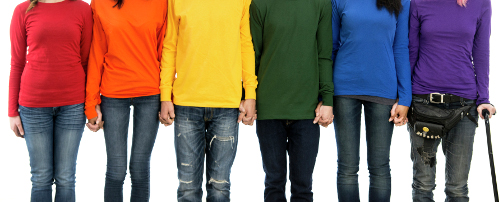BY NATASHA WILSON AND JENNIFER SCHWARTZ

Women's health has gained greater awareness in the last 20 years, in part due to political debate over reproductive rights, and growing understanding of women's experiences accessing healthcare. For women who identify as lesbians, however, these programs may continue to miss the mark. This population experiences a disproportionate risk for certain health concerns, as well as a lack of provider understanding and even stigma (Transgender and bisexual women also face unique healthcare challenges, albeit different from lesbians, that are worthy of further exploration in a future column).
In particular, lesbian women experience health disparities with regard to cancer risk. As with other LGBTQ individuals, this is due, in part, to an increased likelihood of smoking cigarettes and using other substances (this is a common method of coping for those facing family rejection, stigma, or violence due to their identities). Additionally, lesbians have a decreased likelihood of pregnancy (which can be a protective factor with regard to breast, cervical, and uterine cancer), a higher overall Body Mass Index (BMI), and may have a less robust support system than bisexual or heterosexual women. Finally, lesbian women are much less likely to seek preventative care due to concerns about finances, meeting the demands of their own roles as caregivers, wishing to avoid provider rejection, and past negative experiences in healthcare settings. This can result in their health care concerns being more serious, and their treatment options more limited, by the time they access care.
Within the current healthcare system, the majority of patients receive health insurance through their employer or the employer of a spouse or parent. This structure places employment as a gateway to receiving access to healthcare. Unfortunately for lesbians and other LGBTQ people, discrimination in employment remains legal and may have serious healthcare-related consequences. Michigan is a state that does not offer consistent protections to its LGBTQ citizens, which means that if lesbian women and other LGBTQ people are targeted for discrimination in the workplace or are denied employment, they may be unable access to care, as a result.
Even for lesbian women who fall within the poverty guidelines that qualify a person for Medicaid or other assistance, there may be additional barriers to finding competent medical professionals. Assuming a patient is fortunate to have healthcare access, most medical students receive an average of only five hours of study related to the health needs of the LGBTQ population, the majority of which is focused on
HIV prevention and treatment for cis gay men. Even more concerning are the findings of research surveying biases among medical professionals, against lesbians and other LGBTQ patients. A 2014 study – "{URL Attitudes Toward LGBT Patients Among Students in the Health Professions: Influence of Demographics and Discipline https://www.researchgate.net/publication/286526176_Attitudes_Toward_LGBT_Patients_Amon
g_Students_in_the_Health_Professions_Influence_of_Demographics_and_Discipline}" – revealed that, "respondents were more likely to endorse attitudes of tolerance rather than respect for their patients who are LGBT, with the majority of the sample (70 percent) rating themselves as having low self-efficacy for treating LGBT patients."
This gap in understanding and cultural competence has detrimental effects on the health outcomes of all LGBTQ patients and must be addressed.
That said, recent LGBTQ advocacy and Obama-era policies have helped steer grant funding and research toward addressing the unique healthcare needs of lesbians and other LGBTQ populations, including more support for lesbian fertility concerns. However, more research is needed to assess models of care that are effective for lesbians, and to establish the necessity of LGBTQ-inclusive sexual health education and cultural competency training for medical providers. Additionally, funding focused on the provision of LGBTQ-affirming services – apart from HIV – can be difficult to access.
In light of the health risks faced by lesbians, as well as the barriers to competent care experienced by all LGBTQ patients, Corktown Health Clinic (CHC) is committed to providing access to vitally important cancer screenings. CHC, Michigan's first LGBTQ-focused health center, has partnered with the Tri-County Breast and Cervical Cancer Control Program (BCCCP) to provide breast and cervical cancer screenings to uninsured and underinsured lesbian and bisexual women, and transgender men, as part of LGBTQ-affirming preventative care. CHC is also working with community partners to bring mobile mammography services on site for patients. Those interested in the cancer screening program, or seeking other medical services, can contact Corktown Health Center by calling 313-832-3300 to schedule an appointment. CHC is located at 1726 Howard Street in Detroit. Visit CHC online at corktownhealth.org.
LGBTQ-Affirming Preventative Care Available for Lesbian and Bi Women, Trans Men










